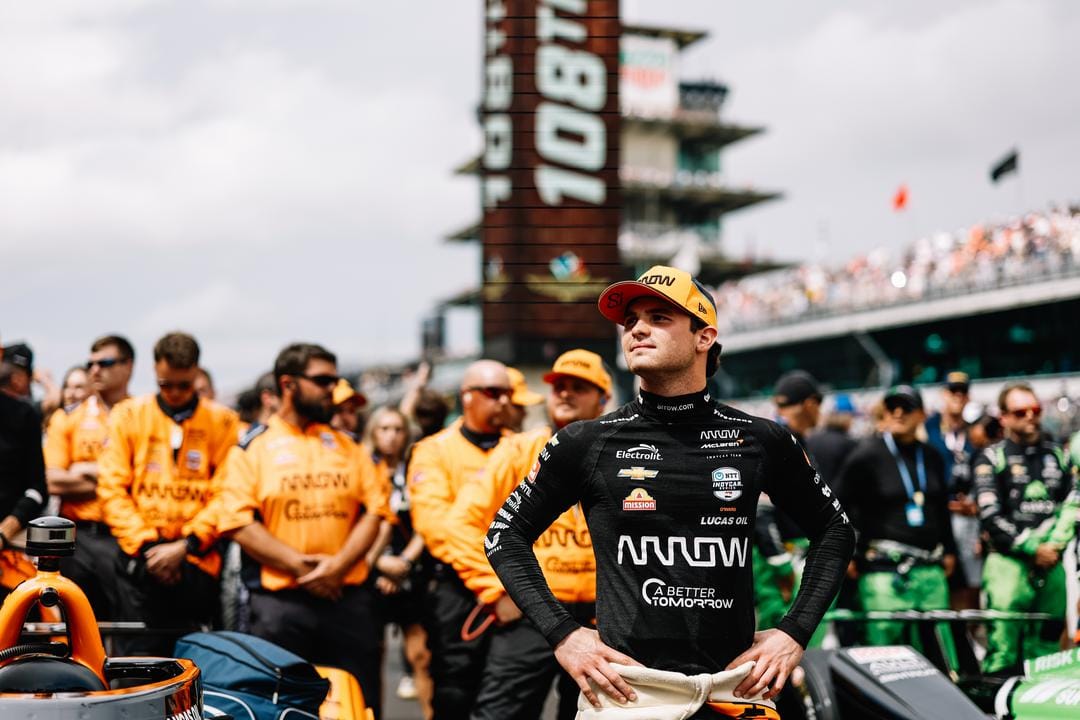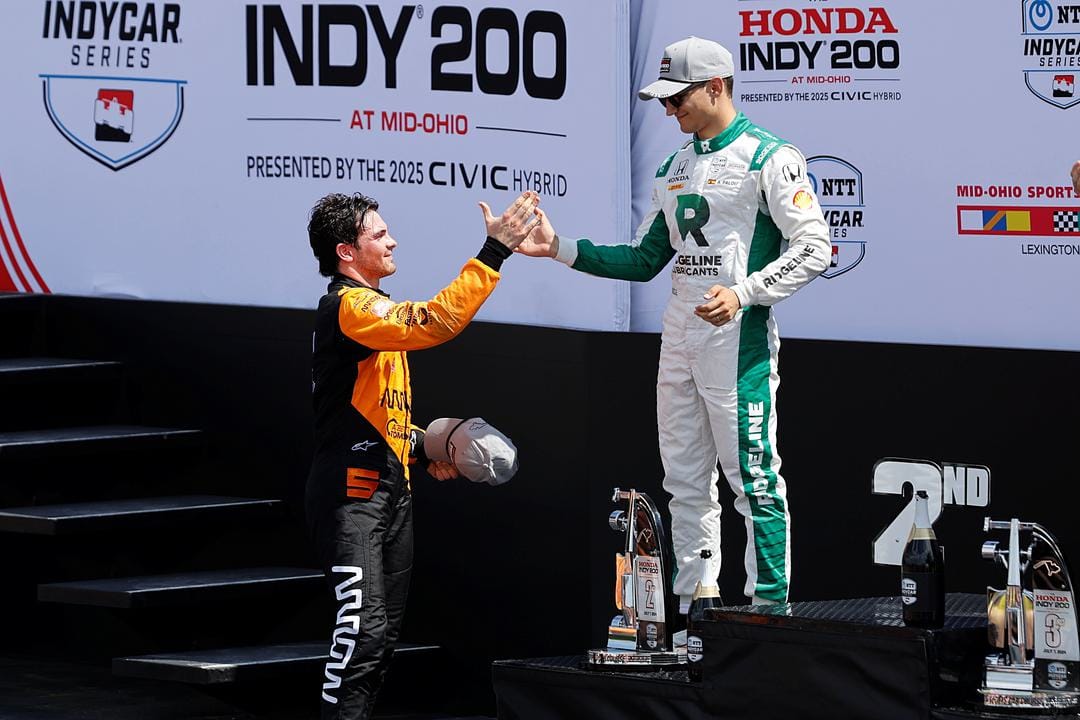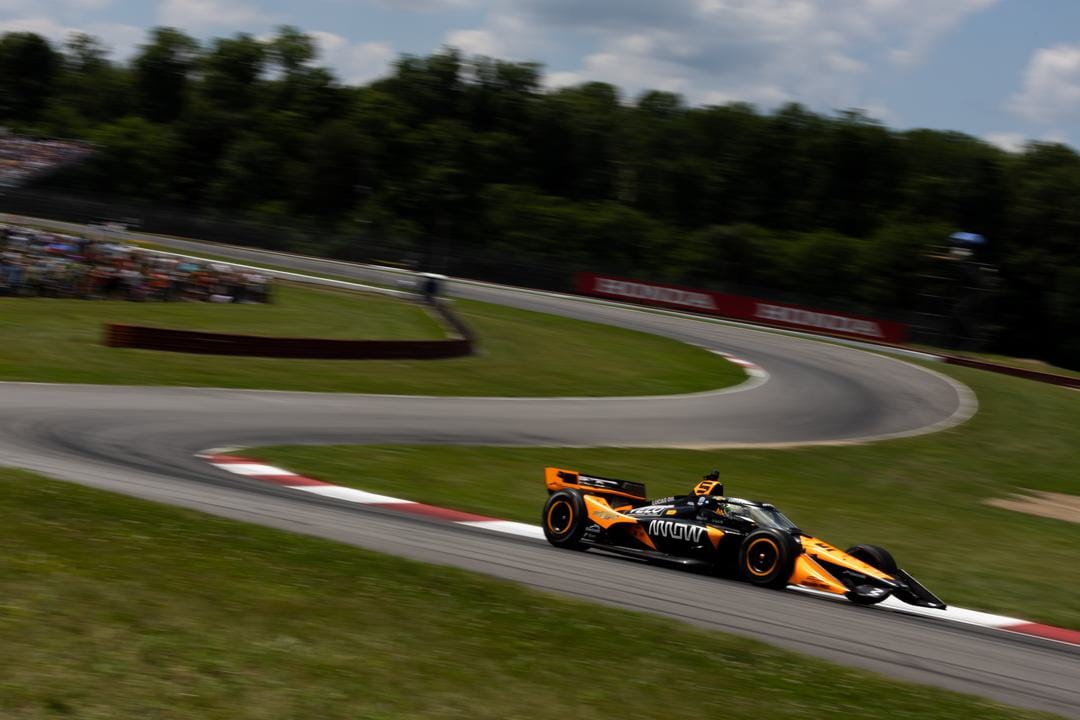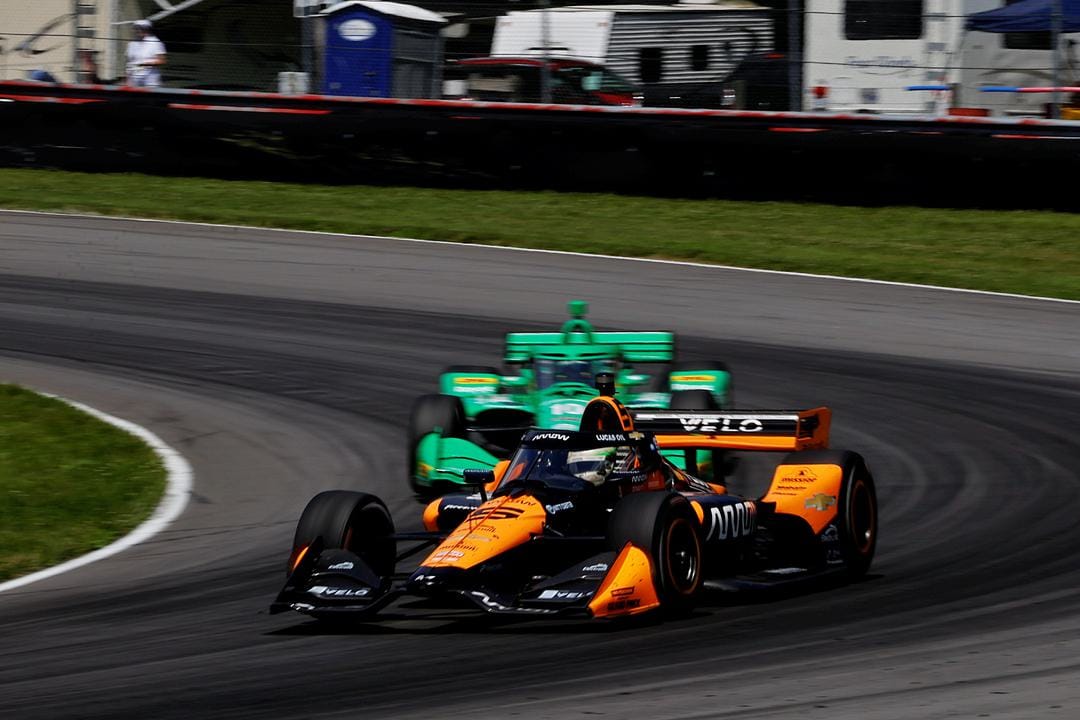[ad_1]
714 days! Pato O’Ward pumps his fists rhythmically on the desk to emphasize the length of that stretch — the time he’s gone without an IndyCar road race win — and his excitement about ending it at Mid-Ohio last weekend.
The year started off very well for Oward. With Alex Palou remaining at Ganassi, Oward emerged as the undisputed leader and number one driver in McLaren’s IndyCar team, as well as benefiting from the F1 reserve driver role that Palou had overtaken.
However, despite a third-place finish at St. Petersburg in the season opener – which became a win after the Penske pay-to-drive scandal, but not until more than a month after the race – a really tough period followed, until last weekend’s Mid-Ohio race ended that run.
That ended the 714-day run we mentioned, which stretched back to Iowa in July 2022, where Ward’s last win was. The period since then has seen questions at nearly every race about when this run might end, what it’s like to finish second so often — five times since Iowa — and where McLaren has fallen short.
“It feels like a certain weight has been lifted off our shoulders,” O’Ward says in an exclusive interview on this week’s episode of The Race IndyCar Podcast.
“You’ve put so much into this, to be close to that, I’d say you’ve put your best foot forward 10 times in the last 714 days…
“Well, we won in St. Pete, we got the points, but we couldn’t celebrate, we couldn’t feel that win.”
The past two years have been tough on O’Ward and the team. Especially since O’Ward is so in tune with his fan base, paying out of his own pocket for fan experiences or hosting races to bring fans in, it’s been a burden for him not to win for them.
When you consider how much expectation O’Ward places on himself, and how much pressure he carries under his own weight, it’s easy to explain some of the rollercoaster moments this year so far.
After St. Pete, the entire team went to Thermal Club, the non-points event, before Long Beach where he qualified 14th and bumped teammate Alexander Rossi from behind, finishing 16th.
Number 5 is gone!
Early problem for @Patricio Wardwhich revolves in the gravel.
📺: NBC and Peacock pic.twitter.com/rH4w5WigRq
— NTT IndyCar Series (@IndyCar) April 28, 2024
At Barber, he started fourth but slid away from Christian Lundgaard who was braking, then collided with Pietro Fittipaldi and later with his team-mate Theo Bourchier, which resulted in him finishing 23rd.
But the alternative strategy did not work at Indianapolis, where he finished 13th.
Some of the mistakes in that period were on his part – I’m not trying to make excuses – but when you put into context the high level O’Ward has played over the years in this team and the pressure he puts on himself, it explains a lot about why he made some of those mistakes or risky decisions.
He knows that there is a line where putting in too much effort leads to this kind of negative outcome as well.
“The weekends in Long Beach and Barber were completely underutilized, and the weekends there were very difficult,” Oward says.
Pato Oard forced to serve a drive-by penalty after hitting Pietro Fittipaldi. 😳
📺 : NBC and Peacock pic.twitter.com/u32KG8dl10
— INDYCAR on NBC (@IndyCaronNBC) April 28, 2024
“The problem is, it’s always a constant battle. You want something so badly, and then you have to force yourself to back off, because it’s so easy to go overboard.
“Since the beginning of May, I would like to say that I have no regrets.”

After finishing second in the Indianapolis 500 last May, Oward added seventh-place finishes at Detroit, eighth at Road America and eighth at Laguna Seca. But while that’s part of a more consistent run, it’s still been tough for him. At Detroit and Road America, he had to back off to avoid a crash at the start.
“I pushed your ass away, and I was like, ‘Ninth. Oh!’” he adds.
“They’re very stressful races where you’re doing your best, and you’re saying to yourself, ‘Am I doing something wrong? What do we need?’
It is very clear from the results and performance that McLaren is not yet at the same level as the likes of Ganassi and Penske.

Yes, O’Ward’s enthusiasm may have cost him some points earlier in the year, but you can believe he got the most out of the car and salvaged many other results that his teammates or many other drivers in the field couldn’t achieve due to his innate speed and talent.
On the team side, it’s been a tough year to get the hang of the tires, and the combination of the car being lighter at the start of the year – because IndyCar introduced weight-saving parts before the (late) arrival of the hybrid – and the overall stiffer tires again to deal with the extra weight of the hybrid, and now, with the weight of the hybrid fixed, this year has been tough to adjust to and overcome.
The company is still doing things like investing in equipment to make up for the years of investment Penske and Ganassi have made. Don’t forget that McLaren is in a workshop that is fit for two cars, let alone three, while it awaits a move to the old Andretti factory next year to have more space and use the resources it has more effectively.

All of this leads to improved performance on the track, especially when the car and rules change frequently.
“I would say last weekend was the first weekend where you didn’t feel like you had to rely on something to help you, or to make the impossible happen,” says Oward. “You were really able to squeeze the most out of this without feeling like there was a knife at your throat.”
This is what people have come to know and love about Oward: his ability to push the limits of what’s possible and deliver the most incredible driving experience we’ve ever seen in IndyCar.
Sure, he makes some mistakes, but shouldn’t he be allowed to do so when he’s pulling off the kind of heroics that no one else can do anywhere else?
He trails Palou by 70 points, but with six of the remaining eight races on oval tracks, Oward has to feel satisfied with closing that gap when that type of track hasn’t always been Palou’s specialty.

Palou’s specialty has always been road courses like Mid-Ohio, where he won last year, but IndyCar’s most decorated driver couldn’t pressure O’Ward into making a mistake even after 25 laps of trying.
O’Ward’s performance has been great, and he’s an IndyCar star. But there’s a reason you hear cheers when he does something good on the track, especially when he wins. He’s the incredible entertainer that IndyCar would be a lot worse off without.
Lost at the end of this win drought was the fact that, despite struggling to adapt this year, McLaren had taken charge. Firstly Hybrid era win and best adaptation to its use.
You have to wonder how much help the team has had from Formula 1 and the knowledge it has about adapting the simulation to include a hybrid unit, which IndyCar hybrid support engineer Kenny Krajnik discussed with The Race last week and said was very helpful.
“It would be great if it made a decisive difference and gave McLaren a big advantage,” reads the closing line of our Mid-Ohio preview.
McLaren ended up winning, yes. But as has been the case so often over the past few years, it was O’Ward who made the decisive difference.

[ad_2]
Source
